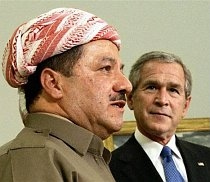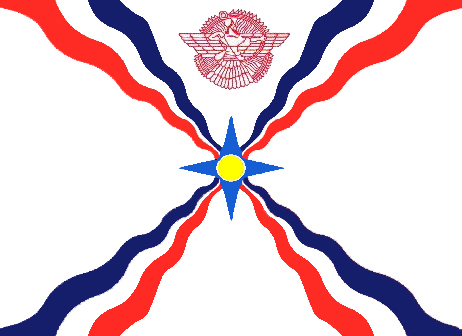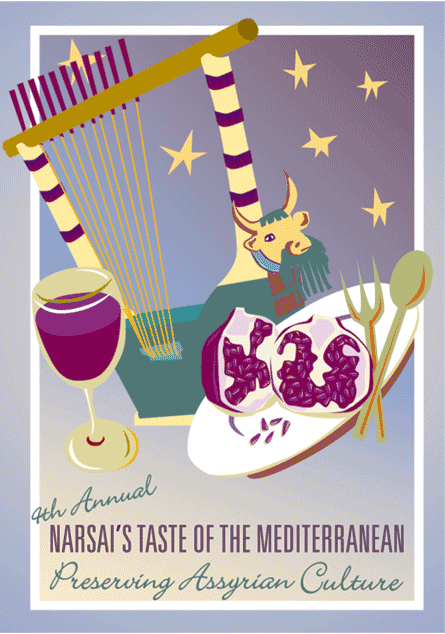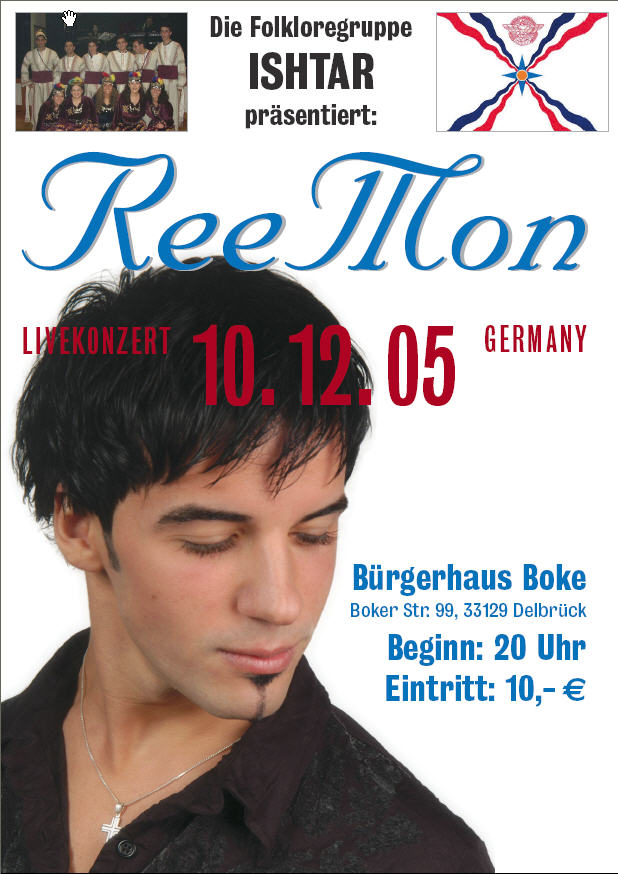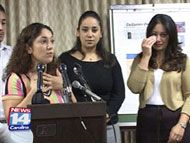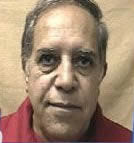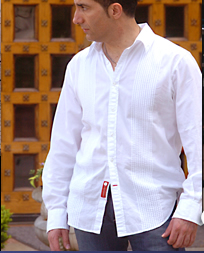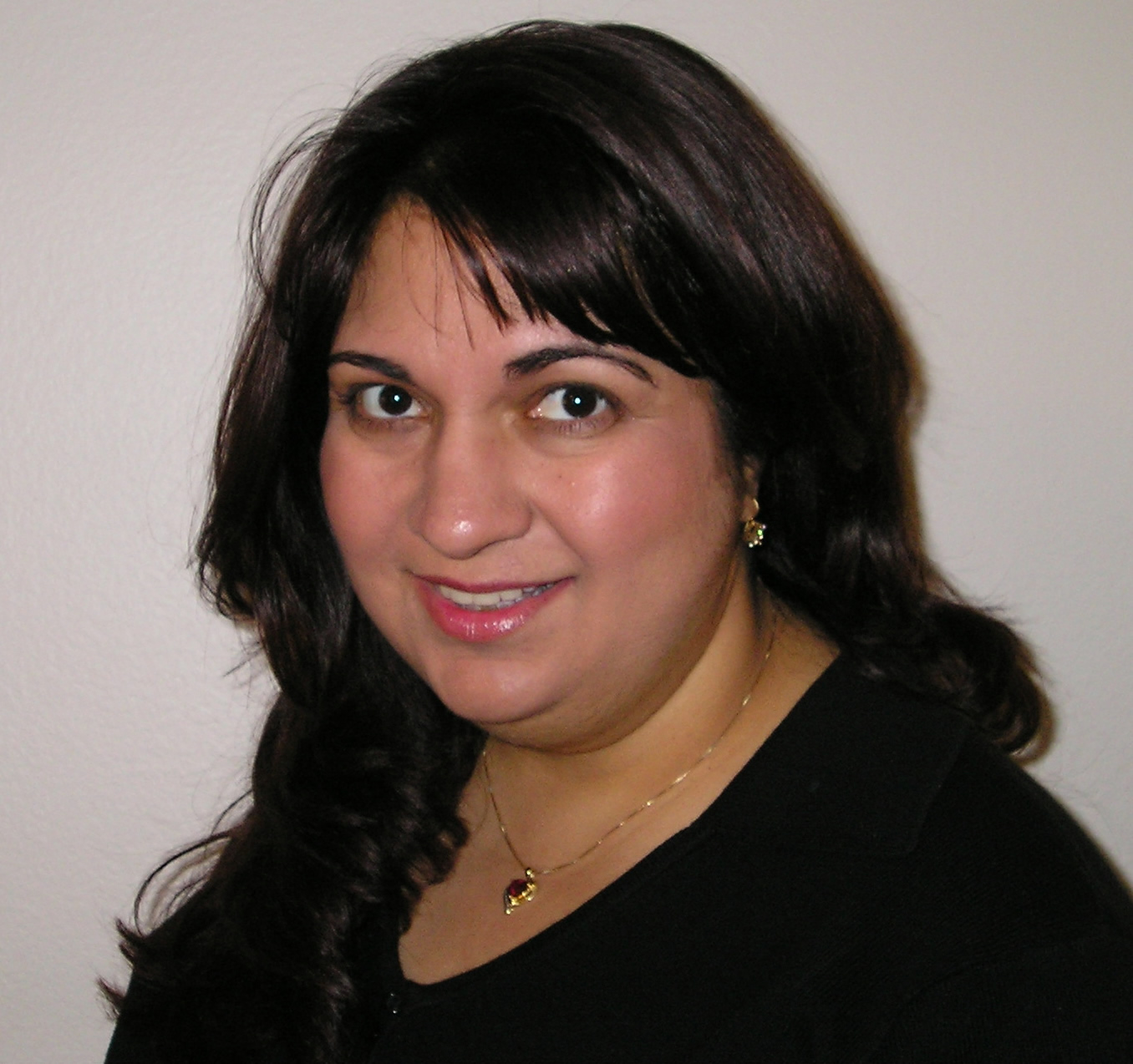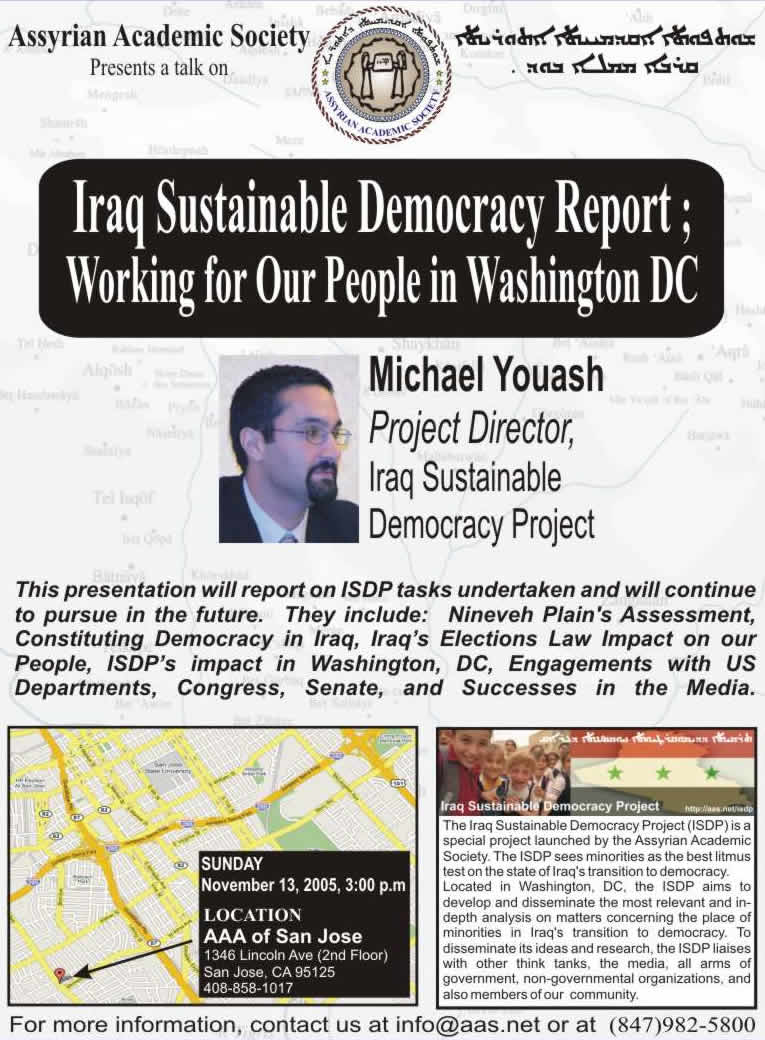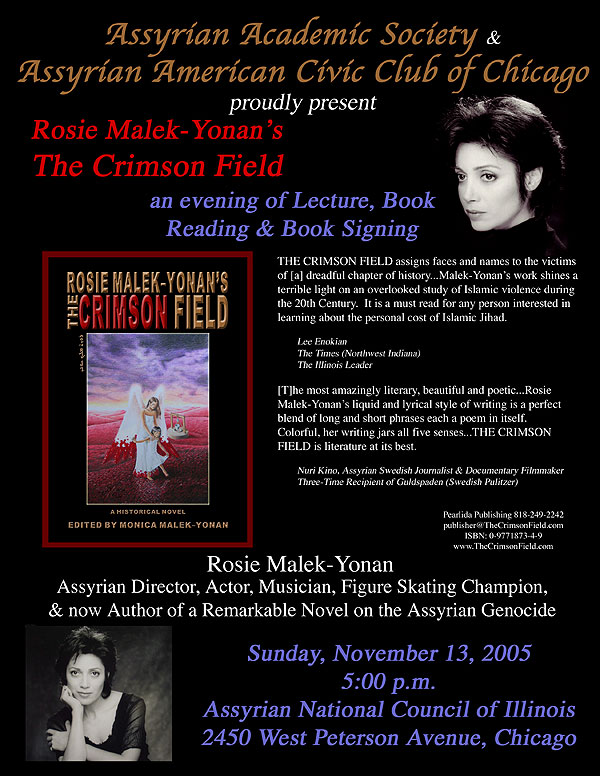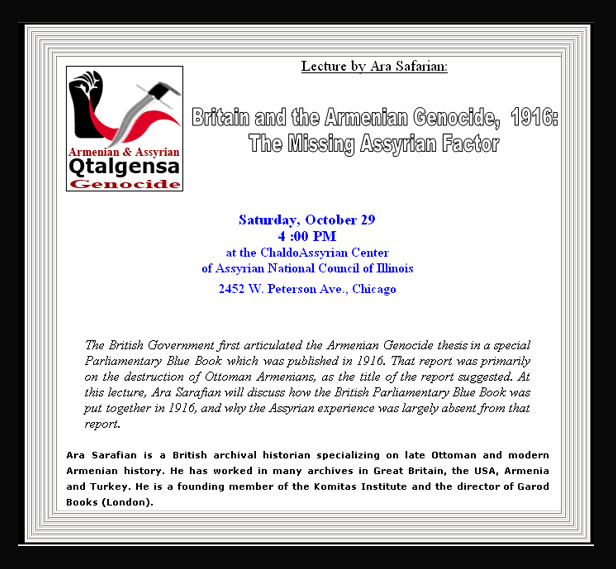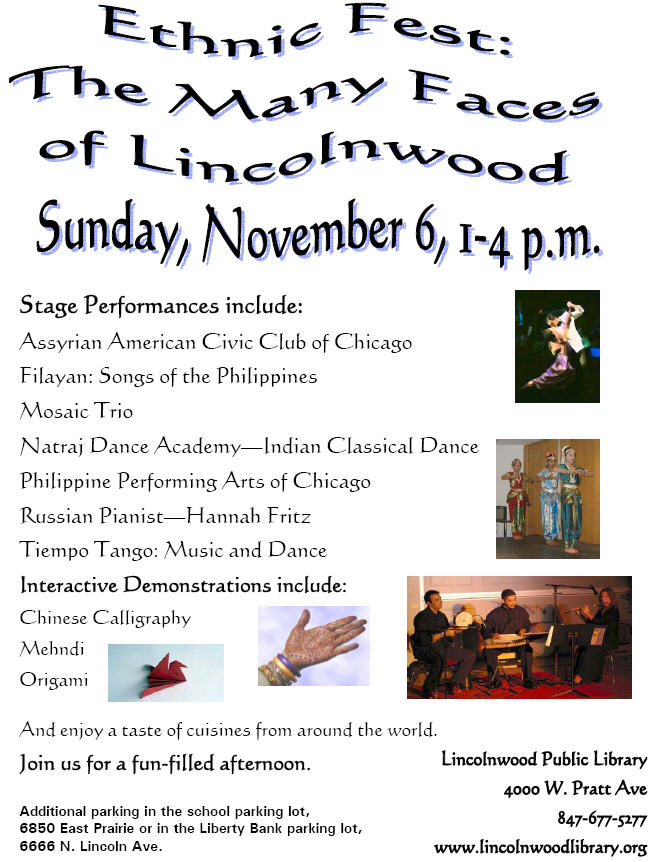The Assyrian Institutions: Self-Destructive Enterprises
Fred Aprim
California
It is stated that the Assyrians' greatest enemies are Assyrians themselves. Oh how true that is! Why is it that a dozen of individuals or half dozen of organizations refuse to support, and/or work with, each other? What is it about these people and groups, who chose to be part of such destructive enterprise, especially in moments of great urgency?
We could excuse and forgive a naïve and uneducated person who does not know enough and makes a mistake, or exercises bad judgment, through which he/she might hurt his/her own people. How could we justify the destructive actions of individuals who are considered educated leaders of this nation? How could we claim to be Christians when we break every single commandment of God and go against every single value of human decency and morality? How dare we face the altar and pray to God and claim to be his humble servants, then come out and stab our brothers in blood and Christ in the back? What is it with this devious hypocrisy, and when would this madness stop?
We thought that tribalism was finally left behind us as we acclimated to certain healthy customs in western societies; however, the more we look around us, the more we see the tribal killer syndrome embedded in our society. Both the Assyrian Church of the East and Assyrian politics are run through tribal mentality. Many Assyrians question if we could do Assyrian matters justice when significant business in Church and politics considers tribal affiliation a requisite.
It is 2:30 a.m. and I just cannot go to bed seeing what is happening around us, listening to speeches of division and of deceit, and reading about so many declarations from clergymen and laity each asking for his/her separate demands from the Iraqi authorities. I want to scream, curse, go out on the street and run, may be I will get to a place where I could find reason. Nevertheless, I know that I could not face this despair by running away. I have so much to get out of my chest, but I always remember my father's words: Son think hundred times before writing about someone or something, consider the family, the relatives, the church, and the community before you do. At the same time, he had taught me to stand by and for the truth, always. We must not hurt one another, the Bible orders us; however, does the Bible order us not to point to the wrong and awful things around us?
We always hope that things will improve, but we continue to be disappointed with every opportunity that presented itself to us. My agony continues to get deeper and deeper. Those who yesterday were pinching our brothers in the back with a needle are stabbing them today with a sword and those who were digging a hole in front of our brothers yesterday are pushing them over a cliff today. Whereas the involvements of the few were a nuisance and inconvenience yesterday, it is becoming a matter of almost life and death for a nation today. If so, what is it with this silence of a nation and what is it with this complete apathy and indolence? Every human being must take certain responsibilities in his/her society and when we get involved, we are expected to serve the best interest of society. When one deviates from such norm, the people must in timely manner react and force aside those who are not serving the interest of the people the best, otherwise, the damage that such people could inflict on the well being and future of the community could be irreversible.
We have stood and watched AssyriaSat for almost two years attack, curse, humiliate, and belittle our only elected leader in Iraq and the only meaningful political group, and I am referring to Mr. Younadam Kanna and the Assyrian Democratic Movement (ADM), without a single protest. We stood and watched this destructive and biased satellite TV station present us no serious alternatives to our dilemma in Iraq besides shinny slogans and worthless commentaries as if to state foolishly that when it publicizes the mistakes and imperfections of others, it becomes by default the savior of the people. We have stood on the sidelines and witnessed self-destructing of a nation and we are yet to lift a finger to rectify the situation. What are we anticipating? This pathetic situation will not correct itself if we do not get involved. We have sat and listened to childish and silly poems by Rev. Barkho on AssyriaSat satellite TV, which exposed to the world a sample of the mentality of this nation's state of decay. Few others made references to Mr. Kanna that embarrass any decent human being when they unleashed their filth across media waves. Is this all what we understand of the meaning of democracy and freedom of speech?
We have sat and listened to speeches of clergymen inciting people to hate, when they should have been the promoters of love, sympathy, and forgiveness as they preach from their altars on Sundays. We have heard consistently from His Holiness Patriarch Mar Dinkha IV that clergymen would not get involved in politics; however, in many statements, speeches, letters to governments, and other actions, we see clergymen consistently being involved. I have no problem with clergymen giving guidance to their parishioners, since they are part of the nation, but the Church should stop this obvious contradiction between what it says and what it does. Finally, I listened to the speech of Patriarch Mar Dinkha last week. Was that not a political speech?
Allow me to put the issue of the nature of the speech aside and discuss the speech itself. There were some very encouraging remarks in that speech; however, we have heard too many of such speeches in the past. A speech that talks about the oneness of our Assyrian, Chaldean, and Suryani people without any meaningful steps and actions to institute that oneness is worthless. Talk is cheap. I personally expect more from the Patriarch in order to prove that he means what he says. I would expect from the Patriarch to pick up the phone immediately, reach out first to His Holiness Patriarch Mar Addai, and undo the mistake of 40 years ago that divided our church into two churches: Old and New Calendars. There should be no reason whatsoever that such step should not be addressed seriously in the Church synod that starts on Monday, October 31, especially now that the Ba'athist interference in church affairs is gone. Where there is will there is a solution; do we have the genuine will to move ahead? Next, Mar Dinkha should reach out to His Beatitude Mar Emmanuel Delly III and do whatever it takes to reach a common understanding now, because now is the moment to do something as we approach the elections in Iraq on December 15 and we do not want to miss this opportunity as well. Visionary leaders of the Church should have resolved all these issues since 1992 when many national and international observers anticipated a change in Iraq, but we missed that. Then came the elections of January 31, 2005, and we were crushed in defeat because of our division. Do we want to miss another opportunity?
My other concerns in the Patriarch's speech center around the followings:
1. Mar Dinkha on two occasions mentioned that northern Iraq was known as Kurdistan. There was no reason for the Patriarch to make such a statement. By saying so, the Patriarch is recognizing Kurdistan on our Occupied Assyria in northern Iraq. There seem to be a pattern in such reference lately and that is alarming. What is the reasoning behind such statement or policy? Some analysts point to the fact that the Church relation with the Kurdistan Democratic Party (KDP) dictates such policy? What alarms me personally is the manner that the Church leadership and the main Assyrian political organization (ADM) are dealing with the Kurdish threat; they are standing in opposite directions. Thus, the Kurds are the most to benefit from such conflict.
2. Mar Dinkha stated that Assyrians were returning to their villages in northern Iraq, as their villages (homes) are being built. This statement supports the claims Kurds and the KDP have made recently regarding the so-called reconstruction of Assyrian villages. The Americans paid 33 million dollars to the Kurds to spend on Assyrian reconstruction villages. Part of this money is under the authority of Sargis Aghajan, Deputy Prime Minister of the Northern Iraq Kurdish Regional Government and a collaborator with the KDP, to build some homes and few churches in selected villages. This limited money spent on Assyrian villages and churches does not cover one-tenth of the total 33 millions assigned to Assyrians. By having the money come from the Kurds, they, i.e., the Kurds, are getting unwarranted credit. This money is not Kurdish money as spread in the media; it is part of Iraq reconstruction money. Stating that Assyrians are returning to their villages, the Patriarch, indirectly, and whether intentionally or not, is defending the Kurdish claims that they are working with the Assyrians, which is not the case. There are Assyrians who work for the Kurds; however, we know that they are Kurdish agents.
3. The Patriarch emphasized on the fact that all three communities: Assyrians, Chaldeans, and Suryanis are one nation. That was wonderful; however, in his final prayer, he stated that all these communities are of Assyrian origin. This has been a problem as we know and the Patriarch knows that as well. Majority of the Chaldeans and Suryanis do not profess with the known historical fact that they are Assyrians. Therefore, when the Patriarch insists that they are Assyrians, this will keep the name issue boiling and the division present, when we should cool it off at this time.
4. The remarks of malik Shamisdin malik Gewargis of Lower Tiyari to the Patriarch, as Mar Dinkha presented them, were distressing. Malik Shamisdin was a close ally of the ADM earlier; however, people change as they say. Malik Shamisdin moved from Baghdad to Dohuk in northern Iraq (Occupied Assyria) and strengthened ties with Sargis Aghajan. Sources to this writer have indicated that malik Shamisdin has received expensive gifts from Aghajan and the KDP. If such statement was indeed made by malik Shamisdin, it is because of his obligation now to Aghajan and the KDP. Nothing is free in this world, and there is always a price and a favor that helpless and weak people have to pay when they accept expensive gifts or money from oppressive groups looking for supremacy. Today, clergymen in northern Iraq are being bribed with expensive gifts and then becoming Kurdish advocates when and as needed.
In my humble opinion, the speech of Patriarch Mar Dinkha will accomplish nothing, unless it is followed by actions that go hand in hand and in that same line of the speech. In the past, we have listened to many of such speeches by different clergymen and politicians; speeches that excited us for that specific moment in which the speech was made. What have those speeches accomplished? The answer is nothing! The Kurds continue to take advantage of our division, and of the incompetence, indecisiveness, and weakness of most of our leaders. Kurds in northern Iraq (Occupied Assyria) continue to move ahead and progress at our people's expense. If we are serious about protecting and preserving our homeland and our people in Iraq by uniting the various fragments of this nation, the present leadership must revitalize itself. Genuine unity and cooperation is the key, nothing else will work. Assyrians are tired of the boring, empty, and useless speeches that are motivated by one reason or another. Our people demand actions just as the old and popular TV commercial questioned: where is the beef?
A Stern Journalistic Reminder To My Kurdish Co-Journalists And The Kurdish Presses!
Ivan Kakovitch
California
Introduction
Not bereft of anachronistic antecedents demeaning the legacy of Assyria as a properly identifiable nationality, par with that of the Arabs and the Kurds, on one hand, and categorizing it with that of the Turkomen, on the other, this article, is intentionally and in good faith, to be seriously considered, if not by the Kurdish political establishments, at least by the Kurdish Journalists and the Kurdish Presses.
Non-Journalistic Approach
Mr. Behrooz Shojai's article 'The Christian Minorities in Kurdistan' of October 11, 2005, is a disservice to all elements involved.
This article specifically obstructs the true nature of history - both past and present - and tarnishes the field of correspondents in their zeal to seek and to press for the truth, at all the times and everywhere that is required.
Also, The Kurds just as much as the Assyrians are inadvertently imputed as insignificantly negligible dwellers of the northern occupied Mesopotamia, a.k.a. Iraq.
Occupation
The Kurds have no obligation to extend a helping hand for the proud remnants of Assyria, by committing themselves to the democratic principles of occupied Mesopotamia. It is beyond Assyria to honor such a suffocating rescue apparatus, since it is a mere façade, which visits them on occasions, deemed necessary for self-advocacy. This chivalrously devoid sustenance of 'minorities', as Mr. Shojai puts it, appears and disappears with seasons of convenience. 'Le flux les apporte, le reflux les remporte'. [Bread cast upon the water].
The ephemeral recompense in trusting some nationals of Assyria with some Ministerial Portfolios, but describing them as purely Christians, is both hypocrisy and fraud.
The Kurds, as formerly oppressed minority of Iraq, ever since its inception, ought to be reminded that despite their assimilation into the ranks and files of both political and military establishments of Iraq, they fought back with all the power they could muster, to retain their identity and their independence.
Citizens of Assyria also happen to be a category of the same cleavage, and they resent, to work, for an occupied Mesopotamia, which may or may not remain Iraq in the future.
Just as the Kurds did not feel dignified enough to attain high positions within the Governments of Iraq, those die-hard citizens of Assyria cherish to attain their national dignity with all the attributes that the Kurdish minority has attained, and seeks to attain more. And, those elements of Assyria that do not wish to follow in the footsteps of their insubordinate brethren, both from within and without occupied Mesopotamia, for their forthright national aspirations, are not with Assyria, and are merely marching to the tune of insipidity in their struggle for Assyria.
National Emancipation
Throughout the past four decades, this writer has vehemently defended the political and territorial rights of the minorities of Iraq, and the Kurdish rights were spearheaded, followed by those for Assyria.
If my mother were a streetwalker, I would still be her son, and she would still be my mother. We would still be an intertwined family entity. Assyria and Kurds have to remain inseparable in their quest for freedom and a dignified existence, just like any other nationality in the world, whether they like each other or not, whether they respect each other or not, whether they resent each other or not. The Kurdish media and its correspondents cannot enshrine and embellish their own parody of a quasi-Kurdish Republic, entombing the other minorities' national rights, within their own geographical boundaries.
Territorial Claim
The claim of Assyria is undisputable. Assyria shall press with vigor, for as long as might take, to retain its title to the land, proportionately allocated to it in the Province of Ninewah. That inexhaustible process of continuance and persuasion to persevere in their aim to attain a portion of real estate, and to call it Regional Government of Assyria, quasi-Republic of Assyria, or Republic of Assyria shall proceed for as long as Assyrians all over the world co-jointly follow the path to reach such a plateau.
Assyria has, throughout the past two-and-a-half millennia, continued to reside within its original indigenous habitat, hence it automatically fits into category of continuously possessing territory. If at times, its population has dwindled from some areas, it was due to oppression, persecution, mayhem and massacres. And, if by coincidence, these trends happen to be the Kurdish outcry, in their stance to attain nationhood, it, therefore becomes the basic core of the founding talisman for Assyria to follow through, in perspicuity.
It is preponderant to note that Assyrians are more nationalistic than many nations. They feel proper ties and personal patronage with their country of origin, even though some of them have never breathed the air of Mesopotamia.
Sovereignty of Iraq
Whenever, and if, Mesopotamia becomes sovereign once again, Assyria shall ask for no less than territorial integrity, par with that of territorial claims made by both Arabs and Kurds, excepting for proportional acreage.
To Assyria, political remunerations are nothing more than encumbrances, anathema to the sea of cultures alien to them. Democracy reenacts itself as profanity, since it dishonors a religiously oriented culture of Assyria by making it submissive to the majority rule.
Democracy is not a rampant dictum instrument. Democracy is not to enforce linguistic, cultural, religious, dress code, nutritional habits and many more facets of life by a majority over the minority. Democracy is not to forcibly unite nationalities. Democracy is to be respected in all aspects, and in the case of future Iraq, Assyria has to evolve as a national entity, with internationally designated boundaries. That is democracy. An ethnic, NOT a national referendum is the result of democracy and its ideals.
Democratization of Kurdistan is a lesson of futility for Assyria, since it shall remain vassal to the Kurd. Assyria tends and intends to be treated as an equal nationality, exactly on the same level as a Kurd aspires for the same equality among Arabs. After all, it is the same Kurd that harbored same aspirations for Assyria, as long as the oppression and political persecution hovered over the Kurd's horizons. And, it is the same Kurd who enlisted the young Assyrian men and women in their struggles from liberty and independence from the Arabs.
Assyria vs. Kurdistan
Assyria has never been, is not, and shall never be Kurdistan. Assyrians are inseparable from the Kurds, as close neighbors, as persecuted entities, and as unrecognized nationalities. Both lived within each other's vicinity for centuries, if not millennia, but they are different entities as people, and thus, ought to proclaim their nations as separate as possible, and, as much as they can muster, not only from each other, but, from free future Iraq. This last phase is preeminent, since both these nationalities shall enforce the issues that might play momentous, internationally acclaimed coups in the years, if not months to come.
Kurds absorbing Assyria, or vice versa is detrimental at least, and suicidal at most for both nationalities deemed to take their place in history, the Kurd for the first time, and Assyria for its rebirth.
And, if the Kurd believes that Assyria is too minute and does not deserve the treatment the Kurd is getting from the Arabs, then, that belief becomes fallacious. Out of 26 million citizens of Mesopotamia, there are no more than 3.5 million Kurds. But, there are no less than 1.5 million Assyrians of all denominations that go by different names. An elementary mathematical configuration shows the ratio to be 14-15% Kurds versus Arabs, and 40-42% Assyrians versus the Kurds.
Thus, if a Kurd is not destined to live under the Arab titular appendage, neither does an Assyrian destined to live under the titular appendage of the Kurd.
The Power
At press time, the power of Assyria is miniscule. But, do not underestimate its resources.
Over one-half of Assyria is spread throughout the world. These 1.5 million Assyrians live mostly in large metropolitan areas. They are urban residents. All their children go to schools, and all accomplish their studies in higher education No less than one-quarter of a million of Assyria are college graduates. Almost one out of eight Assyrians hold a certain level of a college degree. No nation on earth supersedes Assyria in its march to higher grounds of knowledge.
The more oppressed, the more interested Assyria becomes as times go by. There are many young, and old-timers that are profoundly enlisting their efforts to educate this corps of young resourceful generation to come to the aid of its citizens in Mesopotamia.
After all history cannot be ignored.
In 1945, when a Kurdish flag was hoisted for the first time ever recorded, in a Kurdish capital, throughout history, Mahabad, it was thanks to international politics from outside of the framework of, Iraq and Iran, that the late [General Mullah] Mostafa Barzani, founder of KDP, and (father of Mr. Masood Barzani, Regional Kurdish President), as a life-long combatant for independence of the Kurds, and Commander-In-Chief of the short-lived state in today's western Iran [1945-1946], had wrestled a huge chunk of real estate from Iran, and declaring it officially "State of Republic of Kurdistan", but was also referred to as "National Government of Kurdistan.
Outside powers are real, and have to be reckoned with. These powers are also seasonal, and although not dependable, they instill venomous punctures in the areas they attack.
Rest assured my Kurdish journalistic counterparts and the Kurdish Media, that this effort to reintroduce, and to inject nationalistic blood into new generation of Assyria, shall be persevered at all expense, and one day, we might also be banging the trumpets of national glory, instead of dancing to the beats of the drums on our Saints' Days Sheikhanis.
Resolution
Assyria shall refuse to refer to Kurdish dominated area as Kurdistan, as long as a Kurd refuses to acknowledge Assyria.
WHAT SAY YA NOW? MY KURDISH CO-JOURNALISTS, AND THE KURDISH MEDIA!
25 October British Parliamentary Debate
on ChaldoAssyrians of Iraq
 Dr Robert Michael Spink (born 1 August 1948, Yorkshire) is a politician in the United Kingdom. He is Conservative Party Member of Parliament for Castle Point in Essex, and was first elected in 1992. He lost his seat in 1997, but regained it in 2001. The following debate began on the floor of the British Parliament on 25 Oct 2005 at 12.30 pm. Dr Robert Michael Spink (born 1 August 1948, Yorkshire) is a politician in the United Kingdom. He is Conservative Party Member of Parliament for Castle Point in Essex, and was first elected in 1992. He lost his seat in 1997, but regained it in 2001. The following debate began on the floor of the British Parliament on 25 Oct 2005 at 12.30 pm.
Bob Spink: Just this morning, there were two explosions in Sulaymaniyah. According to first reports, nine people were killed. Our condolences and our hearts go to their families. This terrible disaster—this terrorist atrocity—was the first such incident in Kurdistan for about a year.
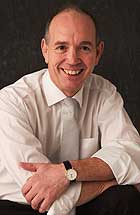 |
Dr. Bob Spink MP, a Kurdish rights advocate believes Assyrians in North Iraq approve of Kurdish Regional Government. Dr. Spink has been a close ally and advocate of Kurdish rights for many years. |
Let me start by making two things clear. The people of the Kurdistan region of Iraq supported the war to remove Saddam Hussein, and they see us as a liberating, not an occupying, force. I was in Iraq during the run-up to the war in February 2003, and I went again in September this year. Therefore, I feel well placed to report on the progress achieved since the war, and I do so humbly in the hope that I can inform the debate.
I pay tribute to the many MPs who have been involved with the area. Hon. Members must often base their decisions on Government briefings. I trust Ministers to act honourably and to give briefings in good faith—they always do. However, we also speak and vote according to what we hear, read or see in sometimes sensationalised media coverage. If we go to war for a people, it is right, if we can, to learn what those people actually feel and think. That is why I have been to Iraq and why I am grateful to Mr. Speaker for allowing this debate so that I can help, in my small way, better to inform the House and the international community.
The bare facts are stark. Ninety-seven of our armed forces have been killed. Our spending approaches £6 billion, and our longer term plans remain relatively undeveloped, although I accept that we now have an honourable exit strategy. This is one of the more important debates of recent years, and addressing the facts at first hand is self-evidently the right approach. The hon. Member for Linlithgow and East Falkirk (Michael Connarty) has just entered the Chamber; he missed my paying tribute to him.
The UK forces are in Iraq at the request of the Iraqi Government and operate as part of a multinational force under resolution 1546 of the UN Security Council. They are providing the necessary support, training and security for the Iraqi Government to build a democratic, safe and prosperous future for their people. Any MP who does not believe that it is an essential part of our job to make the world a safer place, and to tackle human rights abuses wherever there is genuine need, is not following the time-honoured and honourable traditions of this mother of Parliaments.
I pay tribute to our armed forces. I am proud to have served in them myself, if only briefly. They are one of the best disciplined, most professional and most effective forces in the world, particularly in difficult peacekeeping roles. We must do all that we can to protect them, and we must bring them home safely as soon as we possibly can.
I pay tribute to the media who, although they sometimes sensationalise, work with dignity, bravery and professionalism. They do an excellent and necessary job. The 100 British policemen in Iraq have trained almost 15,000 Iraqi police and will end up training about 25,000, and there are many unsung British heroes who are helping in specialist areas. We can be proud of them all.
I gave the Prime Minister a message from Kurdish President Barzani, in which he thanked the British people for "all you have done to liberate his people and help them to secure a safe and democratic future" and asked the Prime Minister to "continue to keep sufficient troops in Iraq to enable the country to reform as a stable democracy".
It is worth putting the Prime Minister's response on record. He stated: "I was pleased you had a good exchange with President Barzani. We will continue to work with him and other leaders to help Iraq develop as a stable democracy. I believe we have a responsibility to the Iraqi people to see through this commitment. We will stay in Iraq for as long as we are needed and not a day longer."
The Prime Minister, like all MPs, must have the courage to make tough personal judgments and stand by them. It is called leadership. I am grateful to him for his responsible and honourable leadership during the post-war period in Iraq. As for the decision to go to war in Iraq in the first place, history will show that it was justified, because on balance it saved lives and suffering.
The Prime Minister said that Saddam Hussein slaughtered more than 1.5 million people. He certainly slaughtered 500,000 Kurds. Thus, on average, 1,000 people were killed every week of his evil regime, and the war stopped that slaughter. That gives moral justification for the war. If the war eventually delivers stability to Iraq and the middle east and enables human rights to progress and democracy to become established, they will represent additional reasons why Britain was right to go to war in Iraq. Whatever one feels about the decision to go to war, we are there and there we must stay until the job is done.
The attempted destabilisation of Iraq, which we saw with the bombs this morning, is driven by various motives. The mindless terrorism of al-Qaeda is a key factor, but perversely the insurgency and terrorism will prolong our stay. Remnants of the Ba'ath Party and some Sunnis remain unable to accept the new order. They do not like the majority Shi'a population gaining democratic controls. There are some who want to destroy the progressive political development and disrupt the co-operation of the three main groups, the Shi'as, Sunnis and Kurds, which has the potential to deliver stability and a better life for everyone in Iraq.
Religious fundamentalism is also playing a part in resisting democracy and progress in human rights. There is also an economic obstacle for some who do not wish to see a stable and prosperous Iraq delivering oil to the international market. Some may feel that it is unhelpful to others who supply that oil in the middle east.
Political, fundamentalist and economic pressures, as well as mindless terrorism, stand in the way of progress for the Iraqi people. Neighbouring countries may not wish to see the Iraqis and in particular Kurdistan achieve sustainable self-determination, but in reality and in the end, self-determination is what the constitution will deliver. That is why millions of Iraqis risked death to vote for it on 15 October.
An hour or so ago, the result came through, with 78 per cent. voting for the constitution, and 21 per cent. against it. Only two districts voted against it. The constitution has been carried with a massive democratic mandate.
Iraq's constitution may eventually fulfil the Kurdish dream and set right the historic injustice to those people. The international community must bring tougher pressures and better rewards to neighbouring countries to ensure that the Iraqi democratic process is not disrupted. The international community must be more relaxed and magnanimous about Kurdistan's development. Help is needed from Russia and other nations on Iran. We need a positive attitude towards Turkey from the European Union. I call on the Security Council to be uncompromising with Syria, and for Russia and other countries to support it.
Kurdistan has made great progress politically, socially and economically, and in developing sound human rights for all its people, including the various ethnic groups and others who live in its administered areas. That is why Kurdistan is planning an advert on CNN International in early November to promote Kurdistan and to thank Britain for the liberation of Iraq.
In planning my September expedition to Iraq, I determined the people whom I would meet and the places and institutions that I would visit. I was accompanied by Ms Bayan Sami Abdul Rahman, the Kurdistan regional government high representative to the United Kingdom. My trip was facilitated by the KRG and the Kurdistan Development Corporation. That interest has been declared in the Register of Members' Interests.
I aimed to revisit the people and the institutions that I met with the hon. Member for Linlithgow and East Falkirk in 2003. I focused on issues such as the validity of the war and our exit strategy, insurgency and terrorism, and the international community's action needed to stop it. I sought to review the Christian situation and to give a balanced and true perspective based on my findings. I considered the important economic progress made in Kurdistan, which is now accepted as the commercial gateway to Iraq. It is very much open for business and supports business-friendly and sustainable commercial laws and policies. I know that well, because I gave a 15-minute speech on it in Iraq while I was there.
I met NGOs and reviewed progress in hospitals and health care. I saw the startling growth of Salahaddin university from 15,000 students, when the hon. Gentleman and I were there, to 22,000 students at present. Massive progress has been made during those 13 months. The university now has 21 faculties. I visited Sami's park in Erbil, where the remarkably successful and peaceful DBX trade show took place, illustrating that normality is returning to Kurdistan.
Michael Connarty: I thank the hon. Gentleman for referring to our visit in straitened, stressful times before the war. I respect his view about the invasion of Iraq, although I do not share it. We visited internally displaced person's camps on our first trip. Are many of the internally displaced persons who were driven out of the two areas of Iraq still there? As for Salahaddin university, did the hon. Gentleman find out whether there was any response to my correspondence with certain faculty members who are being denied the right to come to the United Kingdom because they say they are not members of the Kurdistan Democratic party or the other Kurdish political parties, but are independent academics?
Bob Spink: The hon. Gentleman raises two interesting points. The IDP camps have mainly been disbanded, thank God. There are remnants, but they are being cleaned up quickly. Hopefully, within the constitution by 2007, the position of Kirkuk will be clarified and its remaining refugees can return to their communities and rebuild their lives. I did not deal with the university issue; it was not addressed to me, but I think that we should take it up together with the high representative for the United Kingdom, Bayan Rahman, who will find the answer.
It was moving to see ordinary Iraqis, Kurds and Christians working and playing together in Sami's park. That was named after its creator, Mr. Sami Abdul Rahman, who was tragically killed by terrorists. His dignity and selfless contribution to his country and his people will not be forgotten, and I pay tribute to him. I met about 20 politicians at all levels who represented various political and ethnic groups. President Barzani's message to the Prime Minister, calling for our forces to see the job through, was echoed throughout all sections of his people.
Kurdistan is a model for developing democracy in Iraq and throughout the middle east. It is in much better shape than the rest of Iraq, hence it is now known as "the other Iraq"—as we shall see in early November from the CNN international advertisement. The Kurds are building a decent democracy. Of course, they have had a 10-year start under the no-fly zone. They have the great advantage of the peshmerga. It is a formidable organisation and was one of the targets of the two bombs this morning. Rebuilding has been remarkable in all sectors—political, social and economic—and in terms of infrastructure.
Michael Connarty: I believe that the peshmerga, which the hon. Gentleman mentioned, is a force of 75,000 troops. There are concerns that it sees itself as an independent Kurdish force, and as yet there is no proposal or move to mix it in with the rest of the Iraqi forces. Were there any indications that it would become part of an Iraqi force or does it still see itself—as it did when we were there—as a defence force for the Kurdish area?
Bob Spink: It is my understanding that the peshmerga still sees itself as being quite independent. It is a formidable force and that is one of the many issues with which the politicians in Kurdistan and Iraq will have to grapple. I know that President Barzani is carefully examining how he can move to a more democratic and normal arrangement in that country. We are talking about a country that has been oppressed for many years and is in transition. It is making great progress and we must support it so that the progress continues, and that includes the peshmerga.
Human rights have improved fast in Kurdistan and there is increasing optimism among the people. The students at Salahaddin university represent an important sector of Iraq; in many ways, they are its future. They spoke passionately from their hearts, both privately and in an open vote, after a detailed and sometimes critical debate. They felt safe to exercise free speech in private and in public. They spoke forcefully and gratefully of liberation and of being given a safer and better future by the removal of Saddam. They are like any other students around the world: challenging, questioning, hungry for information and freely giving of their views and ideas. Iraq has a great future in them. They are superb kids.
I was keen to get the views of the Christian community. I spoke to Christian MPs, including the Speaker, Mr. Adnan Mufti, and the Deputy Prime Minister, Sarkis Aghajan Mamendu. I met the Christian Bishop and Father William Jacob, a Kurdish Christian church leader in Sweden who may soon return to Kurdistan, and Christian community leaders. I also visited the Christian community of Ankawa and spoke with ordinary Christian people, both Iraqis and expats from this country and from America, who have lived there for years.
Such people are supportive of the KRG and are pleased with progress. They are concerned at what they see as propaganda by people largely from outside their communities in Iraq who call for an autonomous administrative region for the Christian communities. That is being sold as a safe haven, but from what I saw and heard first hand from the Christian people in Iraq, and from their democratically elected representatives and community leaders, the concept of a safe haven is wholly inappropriate.
Let me set out just a sample of the recent progress that Christian MPs told me about. The KRG has returned Feesh Khabur village to the Christians and is trying to return other villages, many of them places that the Christians lost decades ago. It reconstructed 1,200 houses in the past two difficult years and much more work is in progress. It has provided new water supplies for 26 Christian villages. It built or rebuilt nearly 40 churches since 1991. I visited one being built; there were Christian crosses in the main road leading to it.
There are, pro rata, more Christian MPs than Kurdish ones. There are five Christian MPs. Strictly, proportional representation would dictate that they deserve only two. They were awarded three important ministerial seats in Government, including Deputy Prime Minister and Finance Minister. Thousands of Christians are employed by the KRG, and there are two new Christian radio stations. We could do with some of them in this country. The KRG region has more than 30 Assyrian language schools, which have almost 10,000 students and 500 teachers, and 90 Christian schools and cultural centres have been opened. Those are not acts of oppression but of enlightenment.
Christian MP Romio Acarie said that they were not allowed to use Assyrian names under Saddam Hussein but now, of course, they can. He said: "Comparing life under Saddam with life under the KRG is like comparing Earth with Heaven".
As a result of all this progress, and much more I have not had time to mention, some 5,000 Christians have in recent years left other areas of Iraq to settle in Kurdistan, and they are still moving there—voting with their feet. For context, the Christian population is about 38,000, within a Kurdistan population of 4 million—that is the figure from the last United Nations census, although it is now probably nearer 5 million.
Of course, Kurds lost much under Saddam; they are waiting for their new roads and schools, and for their Kurdish villages to be rebuilt, yet the KRG is positively discriminating to help the Christians. In any event, the Iraqi people's new constitution recognises the cosmopolitan religious and ethnic make-up of Iraq; the Kurds argued for that. It prohibits discrimination on racist, ethnic, religious or other grounds, and it protects minority languages. I feel that the KRG is genuinely trying to help the Chaldo-Assyrians, the Armenians and other Christian groups.
I challenge those outside Iraq who make adverse claims to come to Iraq with me, and to meet and talk to the people themselves. They could question Mr. Shlemon, the Christian deputy governor of Duhok, who said: "Our Community in the Kurdish region in Iraq works successfully with the KRG and with all the peoples of the region. In this peaceful and progressive way, in tandem with those around us, we are developing our homelands, improving our livelihoods and protecting our rich heritage."
I found no evidence of institutionalised discrimination against Christians; quite the contrary—although there are, of course, individual events.
Kurdistan still has much to do for all its communities, such as to repair Saddam's evil slaughter of 182,000 Kurds in his Anfal campaign, in which he razed 4,000 Kurdish villages to the ground, seeking to ethnically cleanse them in an act of brutal genocide. I call again on the international community to accept that that was genocide.
Some people think that we should pull our troops out now; I disagree. I will not succumb to the terrorists. Like all MPs, I have a duty to give leadership on difficult issues, to be honest and to speak the truth as I see it. I hope that people will respect that.
The Iraqi people are risking death by voting. In doing so, they are demonstrating their commitment to the new order. It is in the interests of the middle east—and even, possibly, of world stability—that we see through to the end the job that we have started. I welcome the excellent progress made in the Kurdish region of Iraq since the war.
Mr. Mike Hancock (in the Chair): I hope that eight minutes is long enough for the Minister to respond to the debate.
The Minister for Europe (Mr. Douglas Alexander) : Thank you, Mr. Hancock; I will give it my best shot.
I thank the hon. Member for Castle Point (Bob Spink) for raising this important subject, and for the update he gave on the situation of the Chaldo-Assyrians in northern Iraq. Such first-hand, objective accounts help us to assess progress in our commitment to stand by the Iraqi people as they work towards securing a democratic and stable future.
There is still an enormous amount of work to be done by the international community and Iraqi leaders to ensure that Iraq makes a successful transition from being a country blighted by over 35 years of Ba'athist oppression to one which can regain its rightful place in the international community. A founding member of the United Nations, Iraq needs the help of its neighbours, the region and the donor community to get back on its feet.
Northern Iraq is no exception. Saddam Hussein and his regime inflicted immense hardship and suffering on all the peoples of the north—the Arabs, Kurds, Turkomans, Christians and others. However, as the hon. Gentleman generously recognised, the protection afforded by the no-fly zone enabled northern Iraq to move forward. Since the fall of Saddam's regime, that progress has accelerated.
In security terms, the northern provinces of Dohuk, Irbil and Sulaymaniyah are among the quietest in the country. Incidents in the north are, in general, less severe and far fewer than in other parts of the country. That is not to say that those areas have been spared terrorist attacks. We have received reports today of a car bomb in Sulaymaniyah, which has caused casualties. That is just the latest example of terrorists attempting to derail the political process. Through the multinational forces, we will continue to support the Iraqi security forces in their courageous efforts to defeat all forms of terrorism in their country.
The north's economy continues to develop, as the KRG gradually builds critical infrastructure. There are signs of progress everywhere, the most obvious being the recent opening of airports in Irbil and Sulaymaniyah. The KRG is keen to draw on external expertise to lay solid foundations for the region's future economic growth. Its immediate priority is to develop the agriculture, tourism and manufacturing sectors using local skills, and to expand internal markets so that the economy is less dependent on external markets.
The people of northern Iraq are equally committed to strengthening the political process in the region. They turned out in huge numbers for the January elections, and did so again for the referendum on Iraq's draft constitution. Our consul in Kirkuk had the opportunity to observe voting at a polling station on 15 October. He reported that the voting process took place peacefully.
The fact that nearly 10 million Iraqis nationwide took part in the referendum is eloquent testimony to their determination to exercise their democratic right and to decide the political future of their country. Whatever the result turns out to be—there have been indications of the result this morning—that is a major achievement. It is democracy in action. As Prime Minister Jaafari said, whether Iraqis "vote yes or no is not the point. The victory for Iraq is that they are voting."
What is important now is that all Iraqis participate fully in the political process to ensure that Iraq's Parliament and Government are genuinely representative of all the peoples of Iraq. The UK has provided funds for outreach programmes that set out the political options available, help to explain to the Iraqi electorate the importance of the draft constitution, and broaden understanding of the content. The programmes will focus on explaining the electoral system for the December elections.
Unlike last January's elections, in which Iraq was treated as a single constituency, the December elections will be conducted on a province-by-province basis. The Department for International Development is supporting the Independent Electoral Commission of Iraq's public outreach programme to encourage civil society organisations, particularly at province level, to get involved in the electoral process.
Kirkuk is a good example of why political participation, dialogue, compromise and consensus are critical if Iraq's transition is to succeed. The city brings together several communities within its boundaries. The majority of citizens are Sunni Muslims, but Kirkuk also has a sizeable community of Christians and a small Yezidi community. Iraq's leaders will therefore need commitment and determination to find a solution to the legacy of Saddam's policy of forced Arabisation of Kirkuk. They have agreed to set up a committee that will work towards finding a permanent solution on that difficult and sensitive issue. We will continue to encourage them in their endeavours, and we will continue to encourage and urge all minority groups in Iraq to take part in the political process. The UK Government maintain a close, open dialogue with leaders and representatives of such groups.
The hon. Gentleman made specific reference to the situation facing the Chaldo-Assyrians. Foreign Office officials in London met Mr. Yonadam Kanna, secretary-general of the Assyrian Democratic Movement, during his visit to the UK last week. His primary concern is that the rights of Chaldo-Assyrians be protected. He recognises that the Chaldo-Assyrian community must participate fully in the December elections if it is to be represented in the next Iraqi Parliament. Equally, Chaldo-Assyrian leaders will need to agree a common approach and to identify like-minded political allies in the next Parliament if they are to advance and to protect the rights of all Chaldo-Assyrians. Making such alliances is a key part of parliamentary politics and, of course, would have been unthinkable under Saddam's regime.
Our aim is to help all Iraqis to create a nation where all Iraq's citizens are safe throughout the country, irrespective of race or religious belief. National unity is key to securing long-term stability and prosperity in Iraq. In the transitional process so far, we have seen important symbols of that unity at work. The appointment of an Iraqi Kurd as President of Iraq is a powerful and eloquent signal that the political process can, and does, support the appointment of a non-Arab to high office. President Talabani has used his position to send out a consistent message that Iraqis should come together to support the transitional process. There may be deep disagreement about the way forward; that is too often what politics is about. However, for the vast majority of Iraqis, the only way forward is through peaceful, participative politics.
We have been encouraging the Iraqi Transitional Government to include all Iraq's communities in the political process. Chaldo-Assyrians, Turkomans, Yezidis and Mandaeans all had representatives on the Constitutional Commission. Those representatives were tasked with ensuring that the views of their communities were included in the draft.
I commend the draft constitution to the House. It reflects the multifaceted religious and ethnic make-up of Iraq and offers guarantees of full freedom of religious belief and practice to all individuals. It prohibits discrimination on racist, ethnic, religious or any other grounds, and it protects minority languages. The draft constitution strives to strike a balance between a wide range of views. The final draft text illustrates the extent to which, in the end, all parties were prepared to compromise.
Should the constitution pass at referendum—it seems to be emerging today that it will be passed—that, of course, will not be the end of the process. The text will not be set in stone. A review mechanism has been included in the draft. That will see the establishment of a constitution committee, which the constitutional draft stated will be made up from "the principal groups in Iraqi society and members of the Council of Representatives"—that is, the next Parliament. That committee will be tasked with presenting a report to that Parliament within four months with any proposed amendments to the constitution. That shows the value of sustained and intense engagement in the political process by all Iraq's communities, and that means contesting and voting in the coming elections.
Preparations are well under way for December's elections and the United Nations is working closely with the Independent Electoral Commission of Iraq to ensure that those elections are conducted openly and transparently.
|
